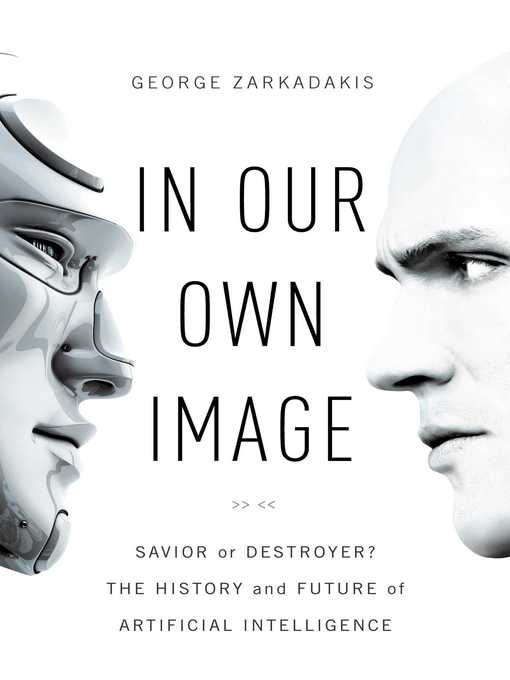
In Our Own Image
- اطلاعات
- نقد و بررسی
- دیدگاه کاربران
نقد و بررسی

Starred review from January 25, 2016
Greek science writer Zarkadakis, armed with a Ph.D. in Artificial Intelligence (AI) and an eclectic tech industry background, rigorously and richly weaves together narrative threads on technology, philosophy, and literature to provide a fascinating history of AI. While many published studies of the human/machine analytic have tended to focus on one development or invention, specialists will recognize that Zarkadakis has left no cybernetic stone unturned—Charles Babbage, Ada Lovelace, Alan Turing, René Descartes, George Boole, Norbert Weiner, and Jacques de Vaucanson all play significant roles in this history. In doing so, Zarkadakis provides the most comprehensive history of AI for our digital age. With a rare combination of literary know-how and scientific knowledge, he demonstrates a keen ability to convey scientific, philosophical, and technical expertise. Zarkadakis passionately, yet carefully, leads readers chronologically through the development of key concepts in the understanding of mind and intelligence. While the book lacks analysis of AI from non-Western perspectives, particularly Japan’s influence on cybernetic thought, Zarkadakis deftly addresses the West’s obsession with the development of artificial beings. By the conclusion of this highly accessible work, Zarkadakis convincingly posits a future in which “post-humanism will have morphed into trans-humanism,” showing how a romance with AI will present humans with a daunting dilemma.

Starred review from January 15, 2016
Advances in computers have made artificial intelligence a new hot topic for most observers--but not science writer and futurist Zarkadakis, who maintains that it is an ancient human obsession. Combining enthusiasm, scholarship, and lively prose, the author, who has a doctorate in AI, points out that as soon as Paleolithic man became self-aware and realized that his companions were also thinking individuals, he took for granted that animals, trees, and even inanimate objects possess human attributes. In the first third of the book, Zarkadakis delivers an ingenious history of our fascination with nonhuman entities, such as ancient religious totems, which were regarded as sentient, and Pygmalion, golems, medieval mechanical automata, Frankenstein, robots, and a torrent of movies, including Fritz Lang's Metropolis (1927), Forbidden Planet (which the author watched as a child, an event that "changed my life forever"), Star Wars, Blade Runner, The Matrix, and Her. Having described the reality, the author then moves on to theory. Some thinkers and scientists and most laymen believe that the mind is immaterial. If so, "how can we ever hope to construct a material computer with a soul? How can we force mindless electrons inside computer chips to become self-aware?" Zarkadakis inclines to the opposing view that the mind is an emergent property of living tissue. Whatever billions of neurons and their trillions of connections can accomplish will eventually emerge from the right software. He does not conceal his excitement as he recounts the history of computing, research that is recording what happens in brains as they observe, decide, think, and feel, and new approaches to programming and design that are already turning out products that, if not yet intelligent, seem awfully clever. A delightfully lucid combination of the history, philosophy, and science behind thinking machines.
COPYRIGHT(2016) Kirkus Reviews, ALL RIGHTS RESERVED.




دیدگاه کاربران